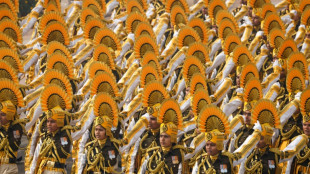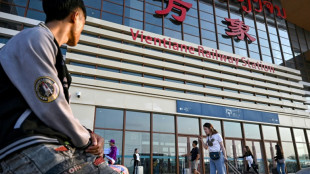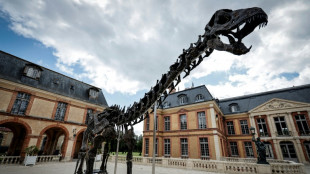

Serbian LGBTQ community rallies after govt threatens EuroPride
Despite being openly gay, Vedran was never interested in taking part in the annual Pride march in Belgrade. But that changed after the Serbian government threatened to cancel an upcoming pan-European LGBTQ event.
President Aleksandar Vucic has demanded the EuroPride march scheduled for Saturday be called off, angering the LGBTQ community in Serbia, where gay marriage is not legal and homophobia remains deep-seated.
Activists have vowed to press ahead with the plans anyway.
"If it's banned, we will walk nevertheless," said Goran Miletic, one of the Belgrade Pride organisers.
For Vedran -- who viewed past pride marches as "street parties" that had shed much of their political mission -- it was a call to action.
"For the first time in my life, I want to fight for my freedom on the street because I have no other way," Vedran, a 28-year-old marketing manager who asked that his surname be withheld for security reasons, told AFP.
"We need a protest, because we want change," he added.
Right-wing groups are now threatening to stage a counter demonstration after a string of rallies in the capital drew thousands of supporters.
"This is the sodomisation of Serbia and a blow to the Serbian Orthodox Church, our people and our traditions," said Dejan Djuric, a protester attending an anti-pride march in Belgrade on Sunday.
Serbia's interior ministry is set to rule on formally banning EuroPride in the coming days.
- Contradictions -
On paper, Serbia has made steady strides in tackling homophobia over the past two decades since the so-called "Bloody Parade" in 2001 when far-right groups attacked Belgrade's first Pride event.
"That was the first time in my life that I saw a priest on the side of the hooligans," said Iskra, a 50-year-old Belgrade resident who was present during the attack.
"Back then, I wouldn't dream of Serbia hosting the EuroPride," she added.
Serbia has since passed anti-discrimination laws and held the last eight Pride events without notable incidents.
Ana Brnabic, who was appointed prime minister 2017, is openly gay.
Yet, below the surface, homophobia remains rampant.
Holding hands in public is still taboo for same-sex couples and almost 60 percent of LGBTQ people in the country say they have faced physical or emotional abuse, according to a 2020 survey.
The powerful Serbian Orthodox Church, which has long played a role shaping public opinion, has thrown its weight behind banning EuroPride, which is hosted by a different European city every year.
"The very word family is clear. It tells us that a man and a woman moved by love and desire to be one have entered into the community in order to have a family," Serbian patriarch Porfirije told thousands of anti-Pride demonstrators from the steps of Belgrade's St Sava Church on Sunday.
And despite appointing a gay prime minister, President Vucic has vowed to not ratify any legislation that could pave the way for recognising gay marriage.
Vucic called for EuroPride to be cancelled in late August, citing a litany of issues, including recent unrest in Kosovo and concerns over energy and food supplies.
Moments before he confirmed Brnabic would serve a third consecutive term as prime minister.
The surprise move against EuroPride came hours before a breakthrough deal was announced by negotiators in Brussels that saw Serbia concede in an ongoing tussle with its former breakaway province of Kosovo.
- 'Distraction' -
The timing has led analysts to suggest the decision was likely a diversion aimed at appeasing Vucic's ultra-nationalist base, which opposes giving any ground on Kosovo.
"He is using the cancellation of the EuroPride as a means to distract the attention of nationalist actors away from the deal he made with Kosovo," said Koen Slootmaeckers, an expert on sexual politics in Serbia at the City University of London.
However, the decision seems to have backfired in some quarters by galvanising straight Serbians to join the Pride march.
Belgrade resident Nemanja Babic, 42, said he plans to participate alongside his wife and baby.
While uneasy about potential security threats at the event, Babic said he was committed to showing support for his friends "who love each other, but cannot legally become a family".
"Freedom can only be universal," he told AFP. "Either we are all free, or nobody is."
O.Braun--MP




